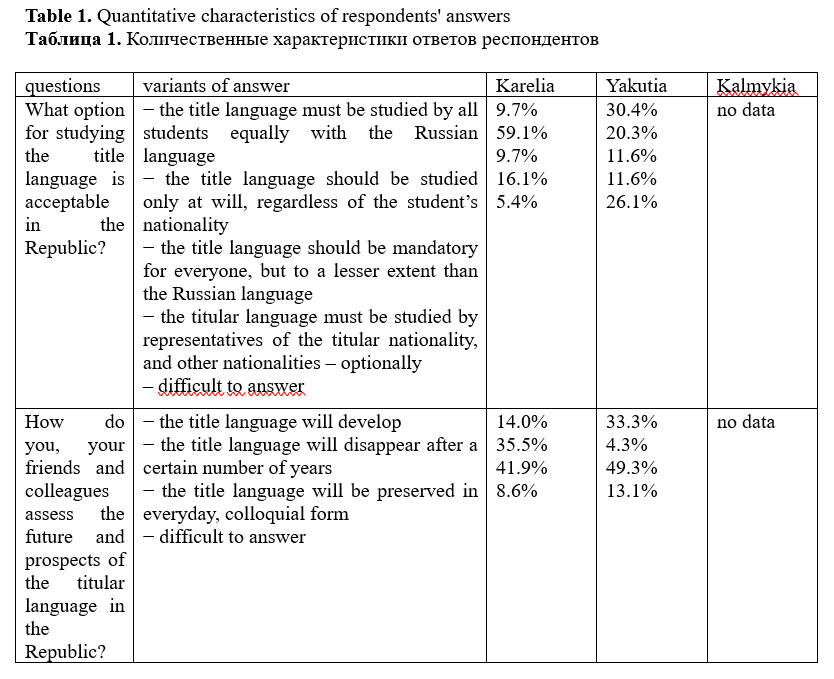Language attitudes: sociolinguistic aspect
Language attitudes are pivotal in shaping spheres of language use, impacting language change and policy. They reflect how communities perceive and value languages, influencing language choice, education, and social interactions. Studies on language attitudes explore preferences in language instruction, societal perceptions, and the potential for language discrimination. Positive attitudes can elevate language prestige, while negative ones may contribute to language decline. Loyalty to a language or a variety can resist influences from a dominant language, especially if a minority language prestige is high. The article comprises reviews on ‘language attitudes’ as a term, an overview of the history of research on the perceptions of a language, analysis of related changes occurring among speakers. The objective of the article is to provide a forecast for the future fate of Karelian, Kalmyk, and Yakut languages by analyzing language attitudes. The focus of the study was on the perceptions of a language held by members of a speech community, i.e., those who have no command of the studied language, as these perceptions were deemed highly significant. When the overall sentiment toward a language is positive, and speech community members recognize the importance of having at least a basic proficiency in it, the prospects for the language's growth appear promising. Such favorable attitudes may lead speech community members to actively encourage language study among their children or grandchildren or even decide to learn the language themselves later in life, creating a potentially fertile environment for a language to flourish.
Figures




Kirilenko, S. V. (2024). Language attitudes: sociolinguistic aspect, Research Result. Theoretical and Applied Linguistics, 10 (1), 17-30. DOI: 10.18413/2313-8912-2024-10-1-0-2


















While nobody left any comments to this publication.
You can be first.
Alpatov, V. M. (2013). Yazykovaya politika v sovremennom mire [Language policy in the modern world], Nauchnyy dialog, 5 (17): Filologiya, 8–28. (In Russian)
Borgoyakova, T. G. and Guseinova, A. V. (2019). Dinamika yazykovogo povedeniya i yazykovykh ubezhdeniy v kontekste yazykovoy politiki respubliki Khakasiya [Dynamics of linguistic behavior and linguistic beliefs in the context of the language policy of the Republic of Khakassia], Philology. Theory & Practice, 12 (11), 342–347. https://doi.org/10.30853/filnauki.2019.11.72(In Russian)
Baker, C. (1992). Attitudes and Language, Multilingual Matters, Clevedon, UK. (In English)
Bourhis, R. Y., Giles, H. and Tajfel, H. (1973). Language as a determinant of Welsh identity, European Journal of Social Psychology, 3 (4), 447–460. https://doi.org/10.1002/ejsp.2420030407(In English)
Callahan, L. (2010). Speaking with (dis)respect: a study of reactions to Mock Spanish, Language and Intercultural Communication, 10 (4), 299–317. https://doi.org/10.1080/14708477.2010.494731(In English)
Dragojevic, M., Fasoli, F., Cramer, J. and Rakić, T. (2021). Toward a century of language attitudes research: Looking back and moving forward, Journal of Language and Social Psychology, 40 (1), 60–79. https://doi.org/10.1177/0261927X20966714(In English)
Dyrkheeva, G. A. and Tsybenova, Ch. S. (2020). Yazykovyye ustanovki i yazykovaya loyalnost nositeley malykh yazykov v usloviyakh natsionalno-russkogo dvuyazychiya (na primere buryat i tuvintsev) [Language attitudes and language loyalty of speakers of minor languages in conditions of national-Russian bilingualism (on the example of Buryats and Tuvinians)], Novyye issledovaniya Tuvy, 1, 62–74. https://doi.org/10.25178/nit.2020.1.5(In Russian)
Edwards, J. R. (1977). Students’ Reactions to Irish Regional Accents, Language and Speech, 20 (3), 280–286. https://doi.org/10.1177/002383097702000310(In English)
Hymes, D. (1971). Competence and performance in language theory, Language acquisition: models and methods, Academic Press, London, UK, 67–99. (In English)
Khilkhanova, E. V. (2022). Yazykovaya ustanovka i yazykovaya ideologiya v zapadnoy i rossiyskoy nauke: o razgranichenii ponyatiy [Language attitude and language ideology in Western and Russian science: on the delimitation of concepts], Vestnik Moskovskogo universiteta. Seriya 19. Lingvistika i mezhkulturnaya kommunikatsiya, 3, 148–162. (In Russian)
Kirilenko, S. V. (2022). Sotsiolingvisticheskiye markery vlasti i solidarnosti v kommunikatsii govoryashchikh [Sociolinguistic markers of power and solidarity in the communication of speakers], Sociolinguistics, 4 (12), 140–153. https://doi.org/10.37892/2713-2951-4-12-140-153(In Russian)
Lasagabaster, D. (2015). Different Educational Approaches to Bi- or Multilingualism and Their Effect on Language Attitudes, in Juan-Garau, M. and Salazar-Noguera, J. (eds.), Content-based Language Learning in Multilingual Educational Environments, 23, Springer, Cham.,13–30. https://doi.org/10.1007/978-3-319-11496-5_2(In English)
Myers-Scotton, C. (2006). Multiple Voices: An introduction to bilingualism, Blackwell Publishing, Oxford, UK. (In English)
Nagmatullina, L. K. and Maksimova, O. A. (2019). Dinamika izmeneniya yazykovykh ustanovok i tsennostey sovremennoy semi [Dynamics of changes in language attitudes and values of a modern family], Vestnik ekonomiki, prava i sotsiologii, 4, 193–199. (In Russian)
O’Rourke, B. and Hogan-Brun, G. (2013). Language Attitudes in Language Policy and Planning, The Encyclopedia of Applied Languages, Blackwell Publishing Ltd., Oxford, UK, 6–7. https://doi.org/10.1002/9781405198431.wbeal0607(In English)
Salmon, W. and Menjívar, J. G. (2019). Setting and Language Attitudes in a Creole Context, Applied Languages, 40 (2), 248–264. https://doi.org/10.1093/applin/amx017(In English)
Tishkov, V. A. (2002). Perepis' naseleniya i menyayushchiyesya identichnosti [The Census and Changing Identities] [Online], available at: http://www.demoscope.ru/weekly/knigi/konfer/konfer_02.html (Accesses 13 February 2024). (In Russian)